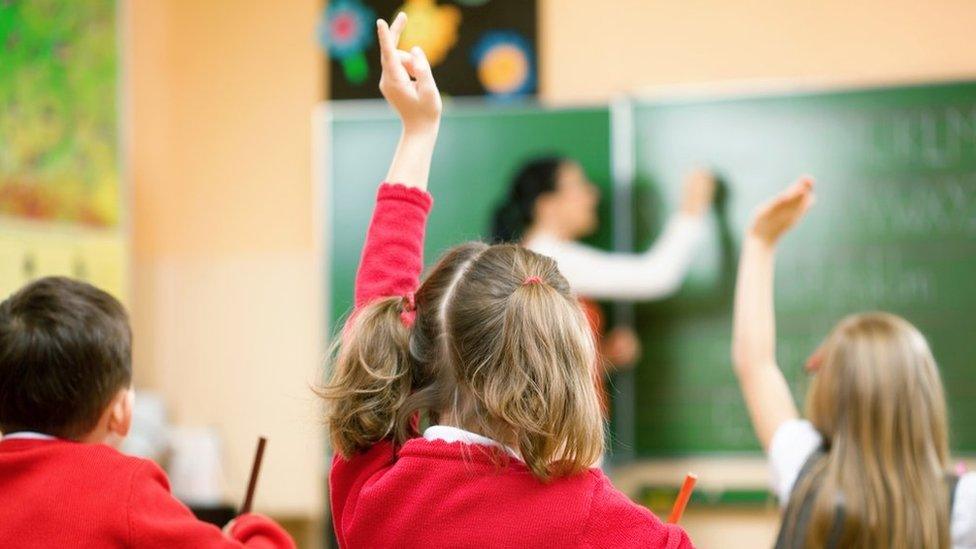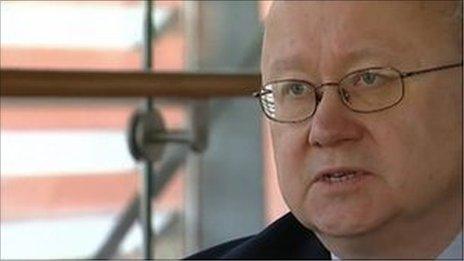Pembrokeshire pupils failed by poor reading and numeracy teaching
- Published
- comments

Pembrokeshire council said its progress had been strong but "too inconsistent and slow"
Pupils in a county which was in special measures for two years are still being failed by poor reading and numeracy teaching, inspectors have said.
Estyn said literacy, numeracy and Welsh second language required improvement in about half of the primary schools and all of the secondary schools it had inspected in Pembrokeshire since 2017.
They also found secondary pupils' behaviour was poor.
Pembrokeshire council said it had made "strong progress".
But it recognised change had been too inconsistent and slow since its education services were put into special measures eight years ago.
This is done when inspectors believe there is a failure to supply an acceptable level of schooling and they appear to lack the leadership capacity to improve.
Pembrokeshire was taken out of special measures two years later but Estyn has found pupils' standards were "too variable".
It is the third council in recent months to be criticised by Estyn for the standard of its education services - both Wrexham and Powys have been told by inspectors their schools pose a "significant concern".
Pembrokeshire has 52 primary schools and six secondary schools.
Its primary schools range in size from 21 pupils at Ysgol Llanychllwydog in Fishguard to 715 pupils at Milford Haven Community Primary School.
Secondary schools range from Ysgol Bro Gwaun in Fishguard, which has 482 pupils, to Haverfordwest High VC School, which has 1,760 pupils.
The Estyn report said in 2019-2020, the council had a budget of £4,856 per pupil which is 13th highest of Wales' 22 local authorities.
Inspectors praised "strong" achievements by pupils studying Welsh as a first language, but said they were concerned by progress among Welsh second language students in half the primaries and all secondary schools.
"Shortcomings in the quality of teaching, including low expectations and a lack of progressive and planned opportunities to develop literacy, numeracy and Welsh second language across the curriculum limit the progress pupils make," the report said.

Inspectors found the number of fixed-term exclusions to be markedly higher than in secondary schools across Wales
It added the number of pupils excluded for five days or less was "notably higher" than the national average in secondary schools.
The inspectors praised the "valuable" work of the behaviour support team in starting to improve pupil behaviour, particularly in primaries.
But added: "However, in secondary schools, particularly in a very few secondary schools, pupils' behaviour is not good enough. Overall, the number of fixed-term exclusions is markedly higher than in secondary schools across Wales."
The council's plans to reorganise education were praised for their "ambitious vision" and "clear strategy", but inspectors found flaws in a small number of areas with improvement proposals "not sufficiently sharp".
It said the county's education services "are causing significant concern and require follow-up activity".
It pledged to work with schools to ensure improvements are made.
Guy Woodham, the council's cabinet member for education and lifelong learning, said: "While there is recognition by Estyn of the progress made since 2012, the pace of change across the local authority has been inconsistent and has not taken place fast enough.
"In going forward it is important that all those involved in education now focus on urgently raising performance outcomes and improving the quality of teaching across all our schools.
"Our ambition remains the same that every learner achieves more than they thought possible."
- Published19 February 2019

- Published12 August 2011

- Published11 August 2011